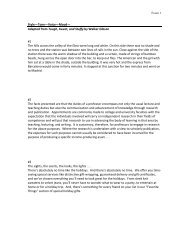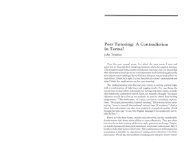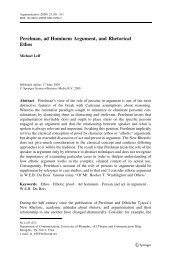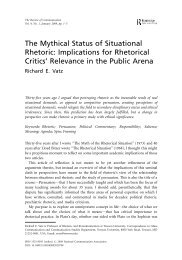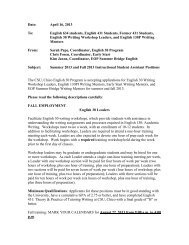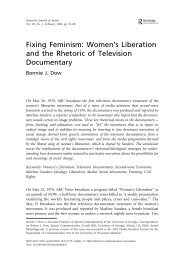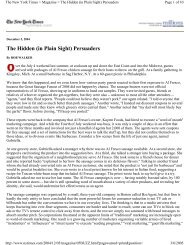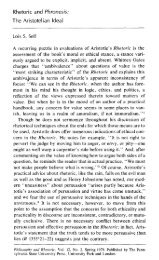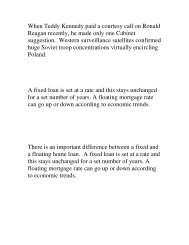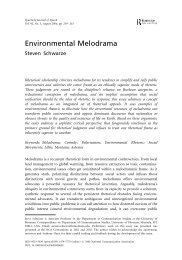Starting Your Commonplace Book with Stanley Fish - CompHacker
Starting Your Commonplace Book with Stanley Fish - CompHacker
Starting Your Commonplace Book with Stanley Fish - CompHacker
Create successful ePaper yourself
Turn your PDF publications into a flip-book with our unique Google optimized e-Paper software.
<strong>Stanley</strong> <strong>Fish</strong>'s Top Five Sentences<br />
By Nina Shen Rastogi (http://www.slate.com/blogs/blogs/browbeat/archive/2011/01/24/stanley-fish-s-top-fivesentences.aspx)<br />
In his new book, How to Write a Sentence and How to Read One, literary critic, legal scholar, and New York Times online<br />
columnist <strong>Stanley</strong> <strong>Fish</strong> offers readers a guided tour through some of the most beautiful, arresting sentences in the<br />
English language. As an introduction to both sentence craft and sentence appreciation, it is—in novelist Adam Haslett's<br />
words—"both deeper and more democratic" than Strunk & White's Elements of Style, celebrating everything from brief<br />
epigrams to twisty, rambling digressions.<br />
<strong>Fish</strong> describes how he carries sentences <strong>with</strong> him "as others might carry a precious gem or a fine Swiss watch."<br />
Accordingly, Brow Beat asked Professor <strong>Fish</strong> for some of his favorite accoutrements, and he offered five from across<br />
three centuries:<br />
John Bunyan (from The Pilgrim's Progress, 1678): "Now he had not run far from his own door, but his wife and children<br />
perceiving it, began crying after him to return, but the man put his fingers in his ears, and ran on, crying, Life! Life!<br />
eternal life."<br />
In this sentence, Bunyan makes us feel the cost paid by someone (anyone) who turns his back on the human ties<br />
that bind and surrenders to the pull of a glory he cannot even see.<br />
Jonathan Swift (from A Tale of a Tub, 1704): "Last week I saw a woman flayed, and you will hardly believe how much it<br />
altered her appearance for the worse."<br />
Here, Swift forces us into a momentary fellowship ("you will hardly believe") <strong>with</strong> a moral blindness we must<br />
finally reject.<br />
Comment [C1]: Uses litotes—deliberate<br />
understatement—to get the satirical effect that <strong>Fish</strong><br />
describes<br />
Walter Pater (from The Renaissance, 1873): "To such a tremulous wisp constantly re-forming itself on the stream, to a<br />
single sharp impression, <strong>with</strong> a sense in it, a relic more or less fleeting, of such moments gone by, what is real in our lives<br />
fines itself down."<br />
The prose enacts Pater's lesson, teasing us repeatedly <strong>with</strong> the promise of clarity and stability of perception<br />
before depositing us on a last word ("down") that points to further dissolution and fragmentation.<br />
Ford Madox Ford (from The Good Soldier, 1915): "And I shall go on talking in a low voice while the sea sounds in the<br />
distance and overhead the great black flood of wind polishes the bright stars."<br />
In this sentence, the personal voice of the narrator is absorbed by the sea sounds (a deliberate pun) that began<br />
as background and end by taking over the scene of writing.<br />
Gertrude Stein (from Lectures in America, 1935): "When I first began writing I felt that writing should go on I still do feel<br />
that it should go on but when I first began writing I was completely possessed by the necessity that writing should go on<br />
and if writing should go on what had commas and semi-colons to do <strong>with</strong> it what had commas to do <strong>with</strong> it what had<br />
periods to do <strong>with</strong> it what had small letters and capitals to do <strong>with</strong> writing going on which was at the time the most<br />
profound need I had in connection <strong>with</strong> writing."<br />
Stein manages to defeat linear time by a circular pattern of repetition that arrests movement even as it moves<br />
forward.<br />
Comment [C2]: You could also say that there’s<br />
asyndeton going on here—repetition <strong>with</strong><br />
emphasis, leading to the final most important word.<br />
It’s a periodic sentence: the most important<br />
elements of the sentence are at the end.<br />
Comment [C3]: Also, the unadorned language of<br />
the plain style, which has few modifiers and a<br />
relatively simple sentence structure, underscores<br />
the simplicity and power of nature depicted in the<br />
sentence.<br />
Comment [C4]: It’s also a running sentence: the<br />
use of conjunctions like “and” and “but” give one a<br />
sense that the sentence could continue on forever.<br />
Which, of course, is the point of what she’s saying.
Other Examples of Stylistic Analyses:<br />
Thus, if you’re drawn to Jonathan Swift’s biting satire in the sentence, “Last week I saw a woman flayed, and you<br />
will hardly believe how much it altered her person for the worse,” then, <strong>Fish</strong> advises, “Put together two mildly<br />
affirmative assertions, the second of which reacts to the first in a way that is absurdly inadequate.” He offers,<br />
“Yesterday I saw a man electrocuted and it really was surprising how quiet he became.” Lame, and hardly Swift,<br />
as <strong>Fish</strong> is the first to admit, but identifying the logical structure does specify how satire functions at the level of<br />
the sentence and, if you want to employ the form, that’s a good thing to know. [ . . . ]<br />
Why is this important? Because the form and rhythm of sentences communicates as much meaning as their<br />
factual content, whether we’re conscious of it or not. In 1863, when General Grant took the city of Vicksburg,<br />
Mississippi, the last hindrance to free passage of Union supplies along the river, President Lincoln wrote in a<br />
letter to be read at a public meeting: “The father of waters again goes unvexed to the sea.” It’s a poem of a<br />
sentence, “The father of waters” and “unvexed to the sea” perfectly balanced on the unexpected pivot of “again<br />
goes” rather than “goes again”, and all in the service of a metaphor that figures the Union as an inevitable<br />
force and the Confederacy as a blight on nature, <strong>with</strong>out mentioning either. If cadence had no content, “Union<br />
supplies lines are now clear” would have the same power. And what is obvious in rhetoric is true in literature, as<br />
well.<br />
Take the first sentence of David Foster Wallace’s story, “The Depressed Person”: “The depressed person was in<br />
terrible and unceasing emotional pain, and the impossibility of sharing or articulating this pain was itself a<br />
component of the pain and a contributing factor in its essential horror.” By mixing heightened feeling and<br />
unrelenting repetition (“pain”, “pain”, “pain”) <strong>with</strong> a Latinate, clinically declarative voice (“component”,<br />
“contributing factor”), Wallace delivers his readers right where he wants them: inside the hellish disconnect<br />
between psychic pain and the modern means of describing it. The rhythm of the sentence is perfectly<br />
matched to its positive content. Indeed, from a writer’s point of view the two aren’t separate. If we could<br />
separate meaning from sound, we’d read plot summaries rather than novels.<br />
Wallace’s anxious, perseverating sentences are arguably the most innovative in recent American literature. But<br />
take a writer who couldn’t be further from his self-conscious showmanship – William Trevor – and listen to a<br />
sentence early in his story “A Day”. “It was in France, in the Hotel St-Georges during their September holiday<br />
seven years ago, that Mrs. Lethwes found out about her husband’s other woman.” Here, the barely perceptible<br />
aural effect is all about sequence. Mrs Lethwes may be the subject of the sentence but Trevor weighs her<br />
down under the qualifying weight of time before she ever appears to then discover her fate. He does this over<br />
and over in the story. The reader may never notice it but when we talk about Trevor’s elegiac tone, this is what<br />
we mean. Not simply that he writes sad stories but that the pathology of his characters has been worked<br />
down in to the rhythm of his sentences.<br />
[From “The Art of Good Writing” by Adam Haslitt, a review of <strong>Stanley</strong> <strong>Fish</strong>’s new book, at<br />
http://www.ft.com/cms/s/2/8c60799c-24e2-11e0-895d-00144feab49a.html#axzz1CA4TZ5jZ]
MODELS FOR YOU—<br />
Please follow these 3 formats for your entries in the <strong>Commonplace</strong> <strong>Book</strong>:<br />
Howlers<br />
Citation: Williams, Terry Tempest. “What Love Looks Like: A Conversation <strong>with</strong> Tim DeChristopher.” Orion<br />
Magazine, vol 31.1(Jan/Feb 2012): 41.<br />
The Original: “From the moment I heard about Bidder #70 raising his paddle inside a BLM auction to outbid oil<br />
and gas companies in the leasing of Utah’s public lands, I recognized Tim DeChristopher as a brave, creative<br />
citizen-activist. That was on December 19, 2008, in Salt Lake City. Since that moment, Tim has become a<br />
thoughtful, dynamic leader of his generation in the climate change movement.”<br />
Analysis and Revision: Characters, Actions, Emphasis, first 7-8 words. “On December 19, 2008, in Salt Lake City,<br />
Tim DeChristopher raised the paddle of Bidder #70 inside a BLM auction to outbid oil and gas companies in the<br />
leasing of Utah’s public lands. Since that moment, this brave, creative citizen-activist in the climate change<br />
movement has become a thoughtful, dynamic leader of his generation.”<br />
Analyses<br />
Citation: Lee, Harper. To Kill a Mockingbird. New York: J.B. Lippincott & Co. 1960. Chapter 16-17, when Atticus<br />
is cross-examining Bob Ewell about his actions the night of his daughter’s attack.<br />
The Original: “‘Mr. Ewell,’ Atticus began, ‘folks were doing a lot of running that night. Let’s see, you say you ran<br />
to the house, you ran to the window, you ran inside, you ran to Mayella, you ran for Mr. Tate. Did you, during all<br />
this running, run for a doctor?’”<br />
Analysis: Harper Lee, through Atticus, uses asyndeton in the passage. By beginning each clause <strong>with</strong> you ran, it’s<br />
a parallel structure that adds emphasis each time as he builds to the final point. This type of series is important<br />
in the underlying motive of the statement. Atticus is trying to emphasize that Mr. Ewell should have run for a<br />
doctor. By using asyndeton, he is saying that you ran here, you ran there, and I could go on and on pointing out<br />
where you did run, but the most important thing is that you didn’t run to the doctor.<br />
Comment [C5]: Full MLA citation<br />
Comment [C6]: Some brief context to help us<br />
understand what’s going on and how the quote fits<br />
in.<br />
Comment [C7]: Names the trope, scheme, or<br />
figure being used<br />
Comment [C8]: Shows how it works<br />
Comment [C9]: Shows what the rhetorical effect<br />
of the passage is<br />
Imitations<br />
Citation: Lee, Harper. To Kill a Mockingbird. New York: J.B. Lippincott & Co. 1960. Chapter 16-17, when Atticus<br />
is cross-examining Bob Ewell about his actions the night of his daughter’s attack.<br />
The Original: “‘Mr. Ewell,’ Atticus began, ‘folks were doing a lot of running that night. Let’s see, you say you ran<br />
to the house, you ran to the window, you ran inside, you ran to Mayella, you ran for Mr. Tate. Did you, during all<br />
this running, run for a doctor?’”<br />
Analysis and Imitation: Asyndeton: “‘Boys,’ the coach began, ‘this team has been doing a lot of scoring on us<br />
today. Let’s see, they scored on a free kick, they scored on a header, they scored on a penalty kick, they scored<br />
on a cross, they even scored on a blocked shot. Did you, during all their scoring, score any of your own?’”<br />
Comment [C10]: Still names the trope, scheme,<br />
or figure being used.<br />
Comment [C11]: Matches the structure of the<br />
original, but substitutes some new content that seems<br />
equally relevant. Choose content that can benefit<br />
from the form just as much as the original does.



